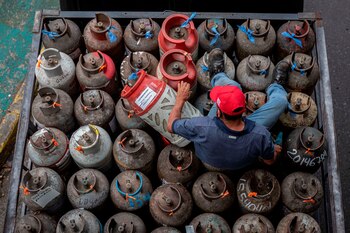
The price of fuel has been a concern for Peruvians for months, and with the international situation the situation has worsened. However, these would be far from going down. According to the latest report published by Osinergmin, on March 14, it would reveal that fuel prices will rise by more than 14% this week.
The published reference prices show that diesel for vehicle use (diesel B5 0-2500 ppm) will increase in S/ 1.78 (14.57%) from the last time and reach S/14.34 per gallon. As for the gasohol of 97, it will go from S/11.42 to S/12.55. Gasohol of 95 will reach S/12,37, while gasohol of 90 will reach S/12,09. On the other hand, the gasohol of 84 will stand at S/11.55, exactly, with an increase of S/1.00 more than last week. It is also indicated that LPG will rise by S/ 0.17 and reach S/3.62 per kilos.
This increase can be expected to be reflected in the wholesale prices that Petroperú and Repsol will publish next Thursday, March 17. These will then be transferred to the taps.
It is recalled that both diesel for transport and bottled LPG (10-kilo ball) are in the Fuel Price Stabilization Fund, so there are no major variations in prices. This fund absorbs upward variations so that they do not reach the final consumer.

SOLUTIONS AGAINST THE RISE
On March 12, the president of the Council of Ministers, Aníbal Torres, revealed that the Executive Branch is evaluating changes in the Tax Selective to Consumption (ISC), which applies to fuels. Currently, fuels are taxed by the ISC, the rolling tax and the general sales tax (IGV).
“We are with (the Ministry of) Economy studying the Selective Consumption Tax. A series of measures to be able to alleviate this reality that we have not caused, but are the result of external elements,” he said in an interview with TV Peru.
However, Gustavo Navarro, former director general of hydrocarbons, said that in the face of these recent increases, what the State is doing is charging more in soles for the concept of fuel taxes. Therefore, he argued that readjusting the CSI would not affect the tax fund.
“As this tax is a percentage of the base price, the State is charging more money. There is no reason why, in an emergency situation like the current one, you should charge more for gasoline, so, without having to affect the tax fund, you should calculate how much the tax tax was charging a few months ago and make the adjustment so that it continues to be charged,” he said, according to the newspaper La República.
This would be a swift measure, since only a supreme decree must be made for it to take effect the next day. Moreover, the impact on prices would be immediate.
INTERNATIONAL COJUNTURA AS A CAUSAL
On March 11, PetroPeru announced that from that day on there will be a substantial increase in fuel prices as a result of the invasion of Russia into Ukraine.
The company noted that this event has led to “the rapid increase in prices internationally” and that “it makes our purchases of crude oil, inputs and finished products more expensive and puts the sustainability of supply in the country in an emergency situation.”
A press release from Petroperú explained the increase in the price of different types of fuels.
“As a result of the armed conflict between Russia and Ukraine, there is a global crisis in the supply of crude oil and derived products, which explains the rapid increase in prices internationally. This situation makes our purchases of crude oil, inputs and finished products more expensive and puts the sustainability of supply in the country in an emergency situation”, indicates the entity.
He adds that “due to the current situation, the prices of our fuels (gasoline, diesel, waste, among others) increased as of today. With regard to bottled LPG and diesel for vehicle use, the current list price remains, given that they are within the Fuel Price Stabilization Fund”.
KEEP READING



